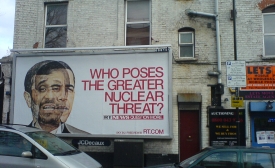cold war
This week, as the Nobel Peace Prize was formally handed to a teenage Pakistani activist and an Indian child-rights campaigner, a Chinese group issued an alternate award to the retired Cuban leader, long regarded by Western counterparts as a tyrant and Cold War nemesis.
Negotiating a peaceful end to the Cold War was a great diplomatic achievement. A little over two decades later, however, we can see that post–Cold War diplomacy did not create a stable international system. Why did diplomacy succeed at the one task, yet fail at the other?

Russia is finding its voice in the world of public diplomacy.
Russia also has ramped up its advances on the information warfare front, aiming a barrage of propaganda at foreigners, particularly at Russian speakers living in its “near abroad.”
As leaders from around the world gather at the United Nations this week for a global summit on climate change, the outlook is gloomy. The U.S, historically the world's worst polluter, can't even decide if man-made climate change exists. Meanwhile, China, the current king of greenhouse gas emissions, is reluctant to sign on to any climate change pact that would hinder its growth. All of which got me thinking about Sting.
Over the course of six weeks during the height of the Cold War, almost three million Soviets visited an exhibition that celebrated America. American kitchens, American art, American cars, and most especially American capitalism. The American National Exhibition in Moscow was a full-court press to convince the Soviet people of American superiority.
Jim Brown: A couple of things: First of all, rock 'n' roll had been outlawed in the beginning in the Soviet Union. In a way--and I'm making a larger film about this--rock 'n' roll became a way to protest the government and to stick up for individualism. It gathered crowds, the Soviet Union wasn't into religion or anything that gathered crowds other than their own communist politics.
A tweet by State Department spokeswoman Jen Psaki Thursday night sparked snarky Twitter responses about the diplomacy of a hashtag – but the tweet really is more evidence of a brewing social media Cold War between the U.S. and Russia.







